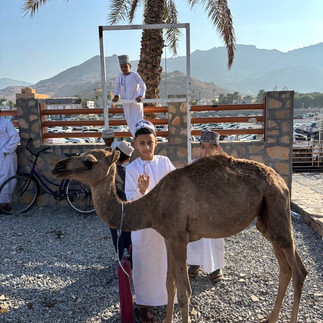One Year on the Road: A Journey from Wall Street to the Ends of the Earth
- Michelle Knesbach

- Apr 22
- 6 min read
Updated: Apr 26
It is hard to believe that it has been a year since I traded my desk chair for a non-stop, bucket-list chasing, whirlwind world tour. As this concept of a “mini-retirement” supposedly becomes more popular, I figured it may be helpful to the curious out there as to what it is actually like to quit your job and embark on a global journey of your own.
For those of you new to my journey, I formerly worked at Goldman Sachs in NYC where I was an investor. After seven years of working on Wall Street, I decided to get rid of my apartment, ship all of my possessions to my parent’s house in Texas, and set out with only a backpack and carry on into the world. My twin sister, Jennifer Knesbach, has joined for the adventure. So far on “World Tour”, we have been to about 30 countries across Africa, Asia, South America, North America, and Europe.
See below for more details on what it is like becoming a modern-day nomad!
A Day in the Life: On this journey, there is no such thing as an “average day”. Some days we are checking off bucket-list items – going to the Khyber Pass, exploring the Taj Mahal, snorkeling in Indonesia, stuffing our faces with street food in Iraq, watching the sunset at the Avenue of the Baobabs, attending a church service in Ethiopia, etc. Other days we are more focused on learning – meeting investors or founders or attending investment summits. Every day brings a new adventure and every day is completely unique.
Working in a Yurt in Mongolia Visiting the Great Wall of China Attending Nepal Investment Summit
The Highs: The most obvious thing traveling for a year has facilitated is knocking SO MANY bucket-list places off my list while I am young enough and mobile enough to fully enjoy them. From the markets of Iraq, the islands of Sierra Leone, the mountains of Mongolia, Everest Base Camp, the wadi’s of Oman, remote villages of Madagascar, the list literally goes on and on… I have gotten to check out some wild places.
Entry gate to the Khyber Pass Incomplete mosque in Mosul, Iraq Animal market in Nizwa, Oman
The more I travel, especially to more strenuous or remote places, the more I am glad I am doing my travel heavy lifting now. Some of this stuff becomes impossible to do at a certain point and if something goes wrong you can bounce back a LOT faster in your young and spritely years. For example, I got flung off a horse while riding in the mountains of northern Mongolia and broke my arm. I was able to keep riding for a few days and tend to it when the timing was more convenient. The repercussions of this break only led to an hour or two of x-ray and cast time. If I was older, this would likely have been a much more severe injury and trip ending.
Broken arm in Mongolia = no problem :) Climbing the Tsingy in Madagascar Extremely rough infra in Madagascar
I have also learned SO much. When I set out on my journey, I wanted to discover more about emerging and frontier markets which I really have gotten to do. Going to so many different markets back-to-back has helped me attain unique views and see opportunities and risks in a whole new way – and let me tell you… I think I have become a whole lot more skeptical. I have also gotten to meet a great investor network.
Additionally, I have learned a lot about development and poverty. I have spent a significant amount of the year in least developed and lower-income countries which has helped me understand the causes of poverty and potential solutions to a much deeper degree. This has reinforced my desire to do more in the space to be part of a solution… but it also has shown me how broken the current system to try to fix this is.
Market in Western Madagascar Road in Western Madagascar Freetown, Sierra Leone
Finally, on the learning point, I have gotten to dig deeper into conflict zone economic development, a topic I have always been deeply interested in. Spending time working in Africa for the Africa Resilience Investment Accelerator, an initiative focused on spurring economic activity in conflict-affected states in Africa, gave me a ground-level view of the unique challenges conflict zone and post-conflict zone economies face. Seeing the dynamics at play in Iraq also furthered my learnings on this.
Rubble in old town Mosul, Iraq from ISIS war Remnants of civil war Freetown, Sierra Leone Blue Nile Valley in war-torn Ethiopia
This additional travel has also facilitated human connection and a “relationship path of least resistance”. Now when I meet people from Iraq or Mongolia or Pakistan etc we bond quicker. Having been to and understanding a country creates natural conversation topics and a ground for mutual respect. This is especially true for the more far-flung ones.
Finally, I have met some very AWESOME people along the way.
And lets be real, nearly everyday is a LOT OF FUN. Who wouldn’t rather be trekking about Torres del Paine on a Tuesday versus sitting at a desk?
The Lows: While it is absolutely incredible to bounce from bucket-list destination to bucket-list destination endlessly, this lifestyle is not without significant drawbacks. Even though I am lucky enough to be traveling with my sister, loneliness has been a huge struggle. While you meet folks on the road, inability to see friends frequently has led to near debilitating lonesomeness. Additionally, being away from friends for over a year has meaningfully eroded the depth of many of my friendships.
FOMO, a term I previously hated and honestly did not really understand, has also been a major struggle. I would be lying if I said it isn’t hard to see friends get promoted, have stable lives, get into top business schools, generally “advance in life”. Meanwhile, I am floating the world ‘aimlessly’. Celebrating my 30th birthday during this journey has only intensified these feelings.
The incredible uncertainty of a lifestyle like this is also very tough. Not knowing what country you will be in in a week…or in some cases the next day…is stressful. The amount of work to plan so many back-to-back trips, trips that often take people months to plan, in addition to planning meetings with investors and business leaders is exhausting. Spending anywhere from a few days to ~3 weeks in one country is not enough time to develop friendships nor create any sort of routine.
Beyond day-to-day uncertainty, I continue to have NO IDEA what I will do when the grand tour comes to an end. It is scary to not have a job or anything lined up. But I guess it is also exciting.
Additionally, the challenges of living in least developed countries can get to you - though they are an important dynamic to understand on a human level. From daily power outages and safety issues, to inefficiencies and things that just don't make ANY SENSE, jumping from that Manhattan lifestyle into the deep developing world is quite a contrast. For example, when I was in Sierra Leone, I got robbed. When I called the police station to report the incident I was greeted with Joy to the World as the wait music... whether this was highly-comical irony (unlikely but funny to think about) or just exceptional incompetency, I will never know. But it is frustrating and makes you feel hopeless in the moment. When the police finally did answer, I was greeted by what felt like a game of 5D chess as those on the other end of the line were clearly on the prowl for a bribe and nothing more.
Police report in Sierra Leone Car hit our apartment in Sierra Leone Off to the office in Sierra Leone
Final Takeaways: Michelle World Tour has exceeded expectations and I am so glad I decided to take the plunge into the unknown. I continue to believe that this was the right decision for me as it has turbocharged my learning curve, allowed me to meet so many new and interesting people, and has been a whole lot of fun.
While this seems like an awesome lifestyle (and let me tell you… it is!), it is definitely not right for a lot of people. While you leave behind the stress of the office, you inherit new and arguably less predictable problems – the challenges of living in least developed countries, incredible uncertainty, loneliness, etc. – that may arguably be harder for some people to manage. However, if you are seriously considering this, I challenge you to pursue a fair assessment and if you determine that it is right for you, fight through the stigma of quitting and just do it because you will likely not regret it
If you are contemplating a mini-retirement of your own, feel free to reach out. If not, I urge you to keep exploring how you can, because the world is an incredible place.








































Comments